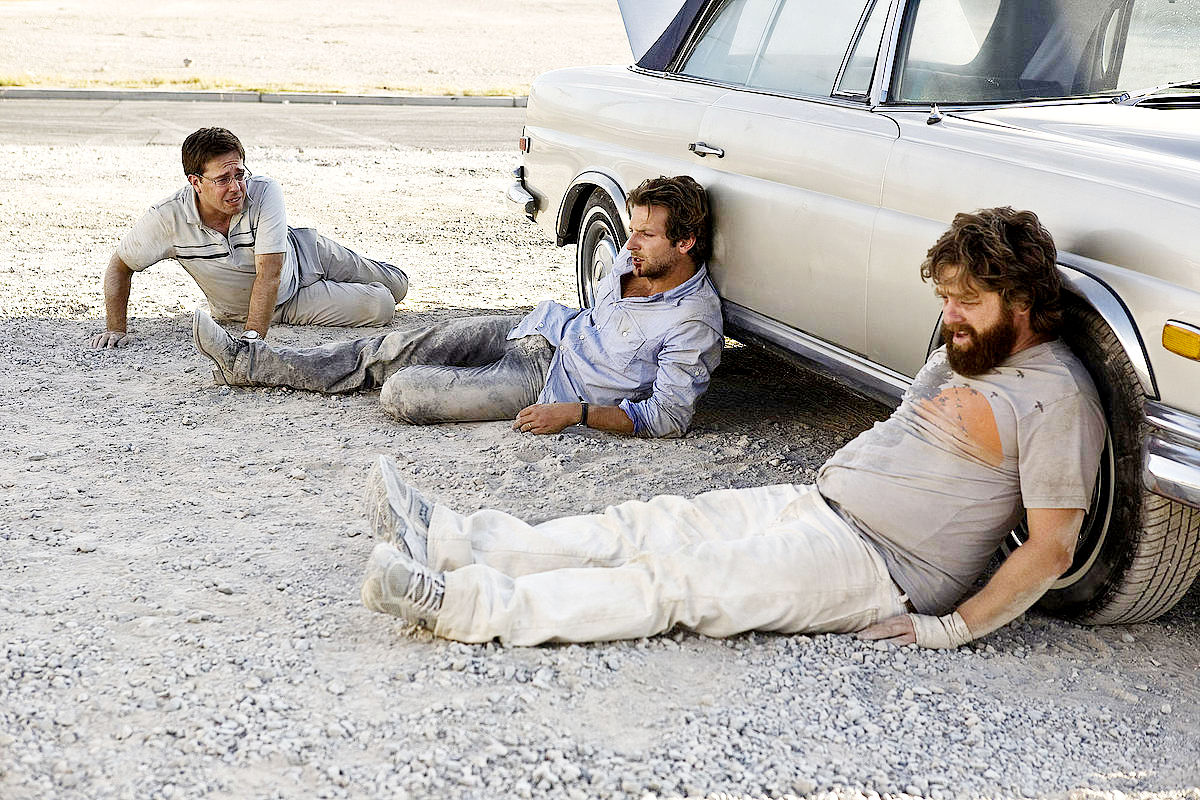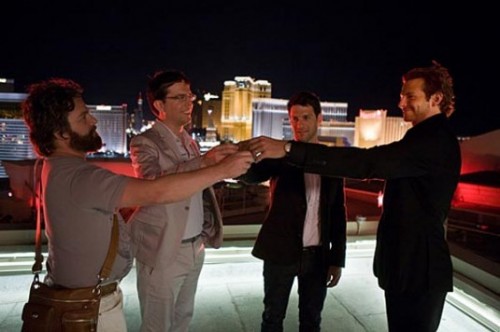Old School Criticism
Speaking of critics, I've been planning to go deeply into this discussion of The Hangover, by Terri Carney, at the Bright Lights Film Journal. But after disagreeing with almost every claim Carney makes, it seemed to me her arguments are so weird that just quoting them would be enough. (Weird, but, alas, not uncommon. I certainly remember reading plenty of this sort of stuff in college.)
I don't mind sociological analysis of popular entertainment, but it seems to me she misunderstands how farce works in general, and how The Hangover is actually about three deeply flawed guys who, for all their faults, are essentially pretty sweet and who also care about women. True, the female characters are generally one-dimensional, but then, all the secondary characters are. For that matter, the primary characters aren't that deep (though better than you get in most farces since they're consistent and take the situation they're in seriously).
Furthermore, Carney's concerned about "misogynistic norms" that films such as this perpetuate, but if you see The Hangover, you'll notice it's mostly men who are being hurt (drugged, tased, arrested, shot, handcuffed, beaten with a tire iron, attacked by a tiger, slammed into by a car, punched by Mike Tyson, etc.). But these "norms" are so well accepted that male pain is merely background noise to her. Furthermore, you can make a case that stereotypical male activity is shown in the film as idiotic. (Of course, you could also make a case that since stealing a cop car is considered funny, the film is anti-government.)
Anyway, here are some selections:
...after having watched The Hangover and read all over the Internet about it, I can't help but wonder if director Todd Phillips is a misogynistic asshole. Or maybe he is just a film director trying to make money by selling a film that denigrates women and celebrates a retrograde version of masculinity. When you live in a culture of rape, either way, it doesn't really matter.
[....] So, at the very least, we need to collectively examine our own complicity with a culture that loves The Hangover, a movie that likes its women stripping, breastfeeding, or waiting at the altar.
[....] there is no excuse for what others have called the "bro-magnon" film The Hangover, which unapologetically and even aggressively defends the model of masculinity that poo-poos date rape as some feminazi invention to further harass those poor, horny, entitled men.
[....] Is his passage into the scripted, empty life of stultifying domesticity the sacrifice that allows for the return to the epic hero even if only for a night? Answering yes to any of these questions reveals a clear longing for a time when men were men, and women's oppression was as natural and sunny as a martini after work and a pretty face.
[....] Near the end of the film, when the three groomsmen realize that they had locked Doug on the roof with his mattress earlier in the evening, they immediately recognize the action as logical: as kids at camp they pulled a similar stunt with a mattress, demonstrating the consistency of personality on roofies. By extension, we see that taking roofies merely enhances your personality and your desires, and your adventures will be intense, yes, but also your own.
[....] The scene in the movie that best stages this tableau is when the wedding singer, Dan Finnerty, gyrates with dancing wedding guests while singing the lyrics to 50 Cent's "Candy Shop." Dan's ballad-like style coupled with the slow-dancing, well-dressed crowd provides a jolting juxtaposition to the raw lyrics of the song, which basically chronicles the details of getting a blowjob. "Let me take you to the Candy shop where you can lick my lollipop." Dan becomes increasingly aggressive with his gestures and ends up bumping and grinding the backside of an unsuspecting older woman to the line "back that thing up." Onlookers' confused and even consternated facial expressions momentarily register an awareness of the ironic moment, and even discomfort with the overly sexualized performance, but nobody actually does anything about it. Even the newlyweds continue to dance happily to the song. This scene reveals how male-centered narratives that position women as objects flow in the background of all of our lives, like muzak, even at sacred events like weddings. It reminds us that marriage is intimately connected to misogyny and the throbbing pulse of macho license to play and desire at all costs.
PS
Carney also includes an irrelevant personal story:
...after viewing The Hangover with my husband in his man-cave, we both felt hungover: like the wedding-goers, Zach Galifianakis, and the parents of that poor baby, we realized we are part of the problem. Just another layer in the mise-en-abyme of complicit inaction, we the viewers, the consumers of this cultural text, go along with the jokes in the hopes that Todd Phillips and his entourage think we are "cool."
Yes, we already got she doesn't like it. I don't care she didn't like it when she watched it at home with her husband. (Though I would like to talk to him about the movie when he's alone.)
I know a couple who think this is the funniest film ever made. The wife likes it better than the husband. She also happens to be a fairly powerful executive in her day job. Maybe Carney needs to come over and explain to her that she's complicit in her own oppression.
PPS
Terri Carney teaches Spanish at Butler University in Indianapolis, where she is also the chair of the Modern Languages, Literatures, & Cultures department. She writes on a variety of topics including Spanish literature, women in the academy, and pop culture.
You have been warned.




5 Comments:
Wait, I thought it was Brett Ratner we're supposed to hate.
Is Heather Graham in the movie, or is it just always a good time to show HG?
Wait...she lets her husband have a "man-cave"? Isn't that oppressive or something?
Heather Graham has the largest female role in the film. I guess that you don't remember her is proof this critique is correct.
Perhaps, but it would be a better proof still if I had seen the film.
Post a Comment
<< Home